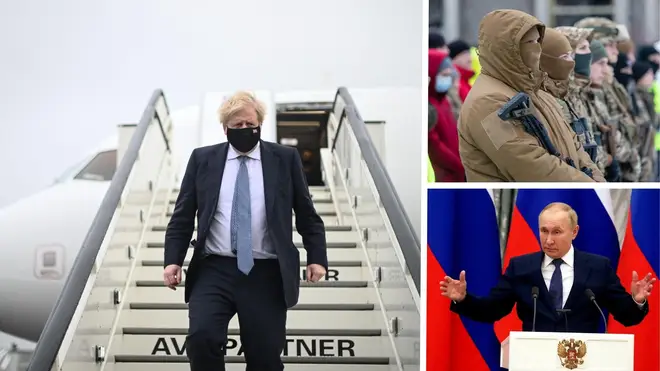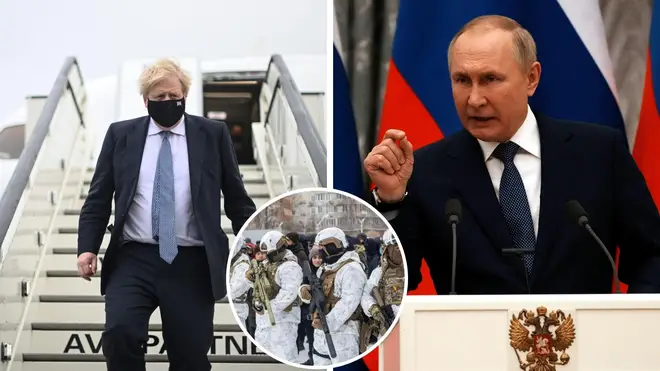
Dean Dunham 9pm - 10pm
10 February 2022, 10:28 | Updated: 10 February 2022, 11:22

Boris Johnson warned this is the 'most dangerous moment' in Europe for decades amid the Ukraine crisis.
In a press conference with NATO Secretary General Jens Stoltenberg the PM said: "We must resist, we must oppose any return to the days when the fates of nations are decided over their heads by a handful of great powers."
He said the next few days would be the "most dangerous moment" in Europe for decades, adding: "The stakes are very high and this is a very dangerous moment."
"This is probably the most dangerous moment I would say in the next few days in the biggest security crisis Europe has faced for decades."
The Prime Minister said Europe could find a way through this crisis, and it is not "just about Russia."
Instead, he said NATO's response was "about upholding the founding principles of an institution... which has brought peace and prosperity to the world."
He added it would be far better for NATO and Russia to initiate dialogue now, "rather than have a catastrophe."
The PM confirmed he has agreed a package of support with NATO including committing more troops, ships and planes.
He did not rule out committing ground troops in the case of an invasion by Russia, but said this would be an "absolute disaster" and would cause major bloodshed.
Read more: 'Step back from invading Ukraine' Defence secretary warns Putin amid Nato talks

Defence Sec warns half of Russia's military is on Ukraine's border
Secretary General of NATO Jens Stoltenberg said signs from the region are grim, and that the increasing numbers of Russian troops stationed around Ukraine is worrying, and means the potential warning time before an invasion is decreasing.
Mr Stoltenberg said: "Nato is not a threat to Russia, but we must be prepared for the worst.
"Russia has a choice," he said: a diplomatic solution, or a confrontation.
"If they choose confrontation they will pay a high price."
This could include sanctions against Russia and an increased NATO presence in the region.
He stressed NATO is open and willing to listen to Russia's concerns, but that renewed aggression will lead to a greater NATO presence.
He added: "NATO will not compromise on core principles."
Speaking to LBC's Nick Ferrari at Breakfast today, Mr Wallace said the UK was prepared to send more troops to Europe if needed, saying “we are one of Europe’s biggest powers, and it’s very important as one of the lead members of NATO we demonstrate not just our words, but our forces are available.
"There could potentially be more deployment [of UK troops]. We’re always ready. It is absolutely the case that you may see more of our forces go to allies in eastern Europe or southern Europe.
"If Russia were to do the wrong thing and invade Ukraine, the first thing you would see is potentially millions, or hundreds of thousands of refugees crossing into bordering states, and that in itself can destabilise the states."
He said soldiers in neighbouring countries on a humanitarian mission are needed to keep things at a "calmer level."
Read more: UK launches diplomatic blitz over Ukraine as PM heads to Poland and Truss lands in Russia
A further 1,000 British troops are being put on standby to prepare for a possible "humanitarian crisis" if Russia invades Ukraine, Downing Street announced.
Boris Johnson is travelling to Poland today for discussions with Polish leaders as the UK offers its support.
The NATO General Secretary thanked the UK for taking a "leading role" in negotiation and support actions.

Looking forward to meeting fellow @NATO leaders today in Brussels and Warsaw.
— Boris Johnson (@BorisJohnson) February 10, 2022
As an alliance we must draw lines in the snow and be clear there are principles upon which we will not compromise, including the right of every European democracy to aspire to NATO membership. pic.twitter.com/XQsfzL6IBa
Meanwhile, Foreign Secretary Liz Truss is in Moscow for talks with her counterpart Sergei Lavrov, in an attempt to urge President Vladimir Putin to draw back from conflict.
Read more: 'Severe' UK sanctions 'ready to go' as 100,000 Russian troops line Ukraine border
In a bid to show further support for a key Nato ally, British troops are also being paced on readiness to provide a humanitarian response if required, although they could also be used to provide further support to allies in the region.
Some 350 Royal Marines from 45 Commando are to begin deploying to Poland as part of a further strengthening of UK support to the country announced earlier this week.
Foreign Secretary Ms Truss warned her Russian counterpart, Sergei Lavrov, that a war in Ukraine would be "disastrous".
Read more: Row breaks out over whether it’s now time to ditch daily Covid stats
This week I am in Moscow to deliver a strong message that war in Ukraine would be disastrous for Russia, Ukraine and European security.
— Liz Truss (@trussliz) February 10, 2022
Russia must pursue a diplomatic path and respect the sovereignty and territorial integrity of Ukraine. pic.twitter.com/MKJQCprHxR
At the meeting in Moscow she said: "The reality is we cannot ignore the build-up of over 100,000 troops on the Ukrainian border and the attempts to undermine Ukrainian sovereignty and territorial integrity.
"Fundamentally, a war in Ukraine would be disastrous for the Russian and Ukrainian people, and for European security. And, together, Nato has made it clear that any incursion into Ukraine would have massive consequences and carry severe costs."
She said: "There is an alternative route, a diplomatic route that avoids conflict and bloodshed."
Ms Truss tweeted the UK "stands squarely behind Ukraine and its people in the face of Russian aggression."
A spokesperson for No10 said: "The Prime Minister met NATO Secretary General Jens Stoltenberg this morning to discuss the alliance’s response to Russian belligerence on Ukraine’s border.
"The pair discussed the diplomatic efforts of NATO members and called on Russia to continue to engage in dialogue and move their troops back from the border with Ukraine.
"The Prime Minister set out his plan to bolster UK military commitments to NATO, including by sending warships to Eastern Europe and increasing UK fighter jets stationed in south east Europe, to provide reassurance and support to allies in the region.
"They agreed on the need for continued deterrence to complement diplomatic efforts, and the NATO Secretary General thanked the Prime Minister for his staunch support of NATO.
"Without continued pressure on Russia by all NATO members, the Prime Minister said he feared for European stability and security."
Back in the UK, Foreign Office minister James Cleverly said new sanction laws against Russia would be in force "this afternoon".
He told MPs: "As I said in my initial statement, I have signed the legislation which we intend to come into force this afternoon.
"The Foreign Secretary is pursuing the diplomatic pressure face-to-face with Russia.
"I, the Foreign Secretary, the Prime Minister and senior officials have regular interactions with our friends and allies both in Europe and across the Atlantic and I can assure the House that they regularly express gratitude for the robustness of the UK's approach in this issue."
But this has seen backlash from some opposition MPs, including Labour's Chris Bryant, who criticised the lack of scrutiny the measures will receive from Parliament.
"It's completely autocratic for Government to publish legislation without any opportunity for anybody to scrutinise it, and frankly they have just been lazy."
This story is being updated